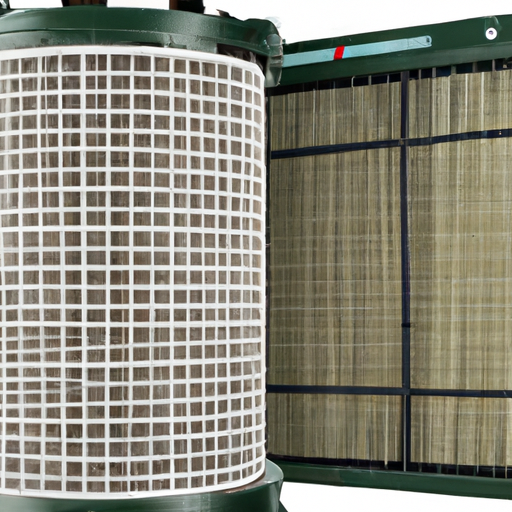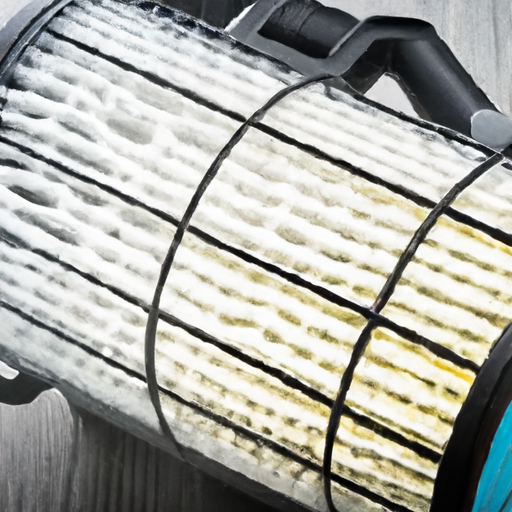Have you ever wondered what an air compressor moisture filter is and why it’s important? Well, in simple terms, an air compressor moisture filter is a device that helps remove moisture or water vapor from compressed air. This filter plays a crucial role in maintaining the efficiency and performance of your air compressor, preventing damage to your tools and equipment, and ensuring a clean and dry air supply for various applications. In this article, we will explore the importance of an air compressor moisture filter and how it works in keeping your compressed air system in top shape. So, let’s get started!
1. Definition of an Air Compressor Moisture Filter
An air compressor moisture filter, also known as an air dryer or compressed air filter, is a device that removes moisture from the compressed air coming out of an air compressor. It is an essential component in any compressed air system, as moisture in the compressed air can lead to a wide range of issues, including equipment damage, decreased productivity, and increased maintenance costs. The primary function of an air compressor moisture filter is to prevent water vapor from entering the air lines, ensuring that the compressed air is clean and dry for use in various applications.
2. Importance of Using an Air Compressor Moisture Filter
Using an air compressor moisture filter is crucial for several reasons. Firstly, moisture in the compressed air can cause corrosion, leading to damage to the equipment and machinery that rely on the compressed air system. This can result in costly repairs or even the need for replacement of the affected components. Secondly, moisture can adversely affect the performance of pneumatic tools and machinery, leading to reduced efficiency, increased downtime, and decreased productivity. Additionally, water vapor in the air lines can cause blockages and contamination, further compromising the functionality of the compressed air system. By using an air compressor moisture filter, you can ensure that the compressed air remains dry, clean, and free from moisture-related issues.

3. How Does an Air Compressor Moisture Filter Work?
An air compressor moisture filter works by employing a combination of filtration and drying techniques to remove moisture from the compressed air. The filter typically consists of multiple stages, each designed to target different impurities. In the first stage, a pre-filter captures larger particles and contaminants present in the air, such as dust, dirt, and oil. The second stage usually involves a desiccant material, such as silica gel or activated alumina, which absorbs the moisture present in the compressed air. Some air compressor moisture filters may also include an additional stage with a coalescing filter, which removes any remaining oil or fine particles. The filtered and dried air is then released into the system, ensuring that it remains moisture-free for optimal performance and longevity of the equipment.
4. Types of Air Compressor Moisture Filters
There are several types of air compressor moisture filters available, each with its own advantages and considerations. The most common types include:
Refrigerated Dryers:
Refrigerated dryers work by cooling the compressed air, causing the water vapor to condense and separate from the air stream. The condensed moisture is then removed through a drain, leaving behind dry air. Refrigerated dryers are highly efficient and widely used in various industries.
Desiccant Dryers:
Desiccant dryers use a desiccant material, such as silica gel or activated alumina, to absorb the moisture present in the compressed air. The desiccant material is regenerated periodically to maintain its drying capacity. Desiccant dryers are particularly effective in low dew point applications or when the compressed air needs to be extremely dry.
Membrane Dryers:
Membrane dryers utilize a semipermeable membrane to selectively remove water vapor from the compressed air. The membrane allows water molecules to pass through, while blocking other gases and contaminants. Membrane dryers are compact and require minimal maintenance, making them suitable for certain applications.
Heatless Dryers:
Heatless dryers use the compressed air itself to regenerate the desiccant material, eliminating the need for additional energy sources. This makes them energy-efficient and cost-effective. Heatless dryers are commonly used in situations where a continuous supply of dry air is required.

5. Factors to Consider When Choosing an Air Compressor Moisture Filter
When selecting an air compressor moisture filter, there are several important factors to consider:
Required Dew Point:
The dew point is the temperature at which moisture in the air begins to condense. It is crucial to determine the required dew point for your specific application, as different filters are designed to achieve different levels of dryness. Some applications may require extremely low dew points, while others may only need a moderate level of dryness.
Flow Rate:
The flow rate, measured in cubic feet per minute (CFM), indicates the volume of compressed air that the filter can effectively handle. It is essential to choose a filter with the appropriate flow rate to ensure optimal performance and prevent any restrictions in the compressed air system.
Pressure Drop:
Pressure drop refers to the decrease in pressure that occurs as the compressed air passes through the filter. It is important to consider the pressure drop when selecting an air compressor moisture filter, as excessive pressure drop can lead to reduced system efficiency and increased energy consumption.
Maintenance Requirements:
Different filters have varying maintenance requirements, including the need for filter replacement or regeneration of desiccant material. Consider the frequency and complexity of maintenance tasks when choosing a filter, as it can affect the overall cost and convenience of using the filter.
6. Installation Process of an Air Compressor Moisture Filter
Installing an air compressor moisture filter is a relatively straightforward process, but it is important to follow the manufacturer’s instructions for your specific filter. Here are the general steps involved:
- Identify the appropriate location for the filter. It should be installed as close to the point of use as possible, downstream of the air compressor.
- Shut off the air supply and relieve any pressure within the system.
- Install any necessary fittings or adapters to connect the filter to the existing pipe system.
- Mount the filter securely in the designated location using brackets or clamps.
- Connect the inlet and outlet pipes to the appropriate ports on the filter.
- Ensure all connections are tight and secure.
- Open the air supply, and check for any leaks in the system.
- Confirm that the filter is functioning properly by monitoring the moisture levels in the compressed air or using any indicators provided by the manufacturer.

7. Maintenance and Replacement of an Air Compressor Moisture Filter
Proper maintenance and regular filter replacement are essential for the optimal performance and longevity of an air compressor moisture filter. Here are some key maintenance tasks to consider:
Regular Inspections:
Periodically inspect the filter for any signs of damage, such as cracks or leaks. Check the inlet and outlet connections to ensure they are secure. Inspect the desiccant material if applicable, and look for any signs of degradation or need for regeneration.
Filter Replacement:
Follow the manufacturer’s recommendations for filter replacement intervals. Depending on the filter type and usage, this can vary from several months to a couple of years. Replace the filter cartridge or desiccant material as instructed to ensure continued effectiveness in removing moisture from the compressed air.
Cleaning:
Clean any external surfaces of the filter regularly to remove dust or debris that can accumulate over time. Use a soft cloth or brush to gently wipe away any dirt. Avoid using harsh chemicals or abrasive materials that may damage the filter.
Drainage:
If your filter includes a drainage system, regularly check and drain any accumulated moisture. This prevents water from accumulating and causing blockages or contamination within the filter.
8. Signs of a Faulty Air Compressor Moisture Filter
It is important to be aware of the signs that indicate a faulty air compressor moisture filter. Here are some common indicators:
Increased Moisture Content:
If you notice a significant increase in moisture levels in the compressed air, it may indicate that the filter is not effectively removing moisture. This can lead to issues such as corrosion, decreased equipment performance, and potential damage.
Pressure Drop:
A sudden and significant increase in pressure drop across the filter is an indication that the filter may be clogged or in need of replacement. Excessive pressure drop can restrict airflow and reduce system efficiency.
Water or Oil Contamination:
Finding water or oil droplets downstream of the filter indicates that it is not effectively removing these contaminants. This can be a result of a damaged or ineffective filter element or desiccant material.
Decreased Performance of Pneumatic Equipment:
If your pneumatic tools or machinery are not performing as expected, it may be due to moisture contamination in the compressed air. A faulty filter can allow water vapor to reach the equipment, leading to decreased efficiency and potential damage.

9. Common FAQs About Air Compressor Moisture Filters
Q: How often should I replace the filter?
A: The frequency of filter replacement depends on various factors, such as filter type, usage, and environmental conditions. Generally, it is recommended to check and replace the filter cartridge or desiccant material every 6 to 12 months. However, it is important to refer to the manufacturer’s instructions for specific guidelines.
Q: Can an air compressor moisture filter remove oil and other contaminants?
A: Some air compressor moisture filters include additional stages, such as coalescing filters, that can remove oil and finer particles. However, not all filters are capable of removing oil or other contaminants. If removing oil is a specific requirement, ensure that the filter you choose is capable of doing so.
Q: Can I use an air compressor moisture filter with any type of air compressor?
A: Most air compressor moisture filters are designed to be compatible with a wide range of air compressor types and sizes. However, it is recommended to check the specifications and compatibility of the filter with your specific air compressor before installation.
Q: Will an air compressor moisture filter eliminate all moisture from the compressed air?
A: While an air compressor moisture filter can significantly reduce moisture levels, it may not eliminate all moisture entirely. The level of dryness achieved depends on factors such as the filter type, operating conditions, and the required dew point for your specific application.
10. Benefits of Using an Air Compressor Moisture Filter
Using an air compressor moisture filter offers a range of benefits, including:
Equipment Protection:
By removing moisture from the compressed air, a moisture filter helps protect your equipment from corrosion, prolonging its lifespan and reducing the need for repairs or replacements.
Improved Performance:
Dry and clean compressed air ensures optimal performance of pneumatic tools and machinery, leading to increased efficiency, productivity, and higher-quality output.
Cost Savings:
Preventing equipment damage and reducing downtime due to moisture-related issues can result in significant cost savings in terms of repairs, maintenance, and production losses.
Enhanced Product Quality:
Moisture-free compressed air prevents contamination of products and materials, ensuring better product quality and reducing the risk of rejections or customer complaints.
Energy Efficiency:
Dry compressed air requires less energy to operate compared to air with high moisture content. By using an air compressor moisture filter, you can potentially reduce energy consumption and lower operating costs.
In conclusion, an air compressor moisture filter is an essential component for ensuring clean, dry compressed air in various industrial and commercial applications. By understanding its importance, working principles, and choosing the right filter for your specific needs, you can protect your equipment, enhance performance, and maximize the efficiency of your compressed air system. Regular maintenance and filter replacement are vital to ensure continued effectiveness and avoid any potential issues that may arise from a faulty or clogged filter. Invest in an air compressor moisture filter today and reap the benefits of clean and moisture-free compressed air in your operations.


